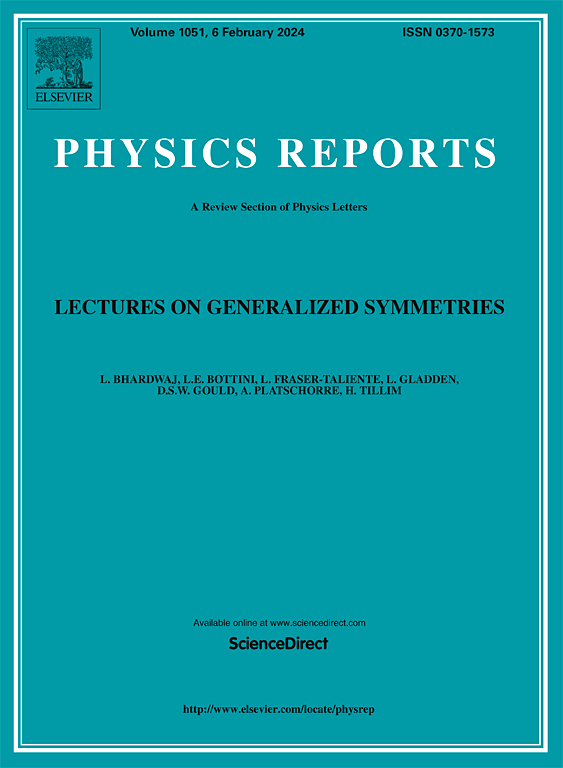A review of quantum correlation sharing: The recycling of quantum correlations triggered by quantum measurements
IF 29.5
1区 物理与天体物理
Q1 PHYSICS, MULTIDISCIPLINARY
引用次数: 0
Abstract
Quantum correlation and quantum measurement are core issues in understanding the quantum world. Revealing quantum correlations in microphysical systems through proper quantum measurements became an important research topic in the last century and gave rise to the birth of quantum information technologies. However, quantum correlations, quantum measurements, and their relationship are not yet fully understood and require further clarification. The development of generalized quantum measurement and non-destructive measurement provides new possibilities for studying these issues. In the past decade, a series of studies on quantum correlation sharing through sequential generalized measurements have unveiled a new avenue for exploring quantum correlations. These studies not only have important fundamental significance, but also involve the unexplored issue of quantum resource recycling. This review thoroughly examines recent advancements in quantum correlation sharing. It begins by elucidating the fundamental reasons for quantum correlation sharing based on the interpretation of joint probabilities, and discussing the basic definitions and concepts. Next, the sharing of Bell nonlocality under different measurement strategies and scenarios is carefully examined, especially pointing out the impact of these strategies on the maximum number of parties that can exhibit Bell nonlocality. The subsequent chapters provide an overview of other forms of quantum correlation sharing, including quantum steering, network nonlocality, quantum entanglement, and quantum contextuality. Furthermore, we summarize the advancements in the application of quantum correlation sharing across various quantum tasks, highlighting examples such as quantum random access codes, random number generation, and self-testing tasks. Finally, we discuss and enumerate some key unresolved issues in this research area, concluding this review.
量子相关共享回顾:量子测量引发的量子相关性再循环
量子关联和量子测量是理解量子世界的核心问题。通过适当的量子测量揭示微物理系统中的量子相关性成为上世纪的重要研究课题,并催生了量子信息技术的诞生。然而,人们对量子关联、量子测量以及它们之间的关系还没有完全理解,需要进一步澄清。广义量子测量和非破坏性测量的发展为研究这些问题提供了新的可能。在过去的十年中,一系列通过顺序广义测量进行量子相关共享的研究为探索量子相关揭开了一条新的途径。这些研究不仅具有重要的基础意义,还涉及尚未探索的量子资源再利用问题。本综述深入探讨了量子关联共享的最新进展。文章首先根据联合概率的解释阐明了量子相关共享的基本原因,并讨论了基本定义和概念。接着,仔细研究了不同测量策略和情况下的贝尔非局域性共享,特别指出了这些策略对能够表现出贝尔非局域性的最大各方数量的影响。随后的章节概述了其他形式的量子关联共享,包括量子转向、网络非位置性、量子纠缠和量子上下文。此外,我们还总结了量子关联共享在各种量子任务中的应用进展,重点举例说明了量子随机存取码、随机数生成和自测试任务。最后,我们讨论并列举了这一研究领域中一些尚未解决的关键问题,从而结束本综述。
本文章由计算机程序翻译,如有差异,请以英文原文为准。
求助全文
约1分钟内获得全文
求助全文
来源期刊

Physics Reports
物理-物理:综合
CiteScore
56.10
自引率
0.70%
发文量
102
审稿时长
9.1 weeks
期刊介绍:
Physics Reports keeps the active physicist up-to-date on developments in a wide range of topics by publishing timely reviews which are more extensive than just literature surveys but normally less than a full monograph. Each report deals with one specific subject and is generally published in a separate volume. These reviews are specialist in nature but contain enough introductory material to make the main points intelligible to a non-specialist. The reader will not only be able to distinguish important developments and trends in physics but will also find a sufficient number of references to the original literature.
 求助内容:
求助内容: 应助结果提醒方式:
应助结果提醒方式:


